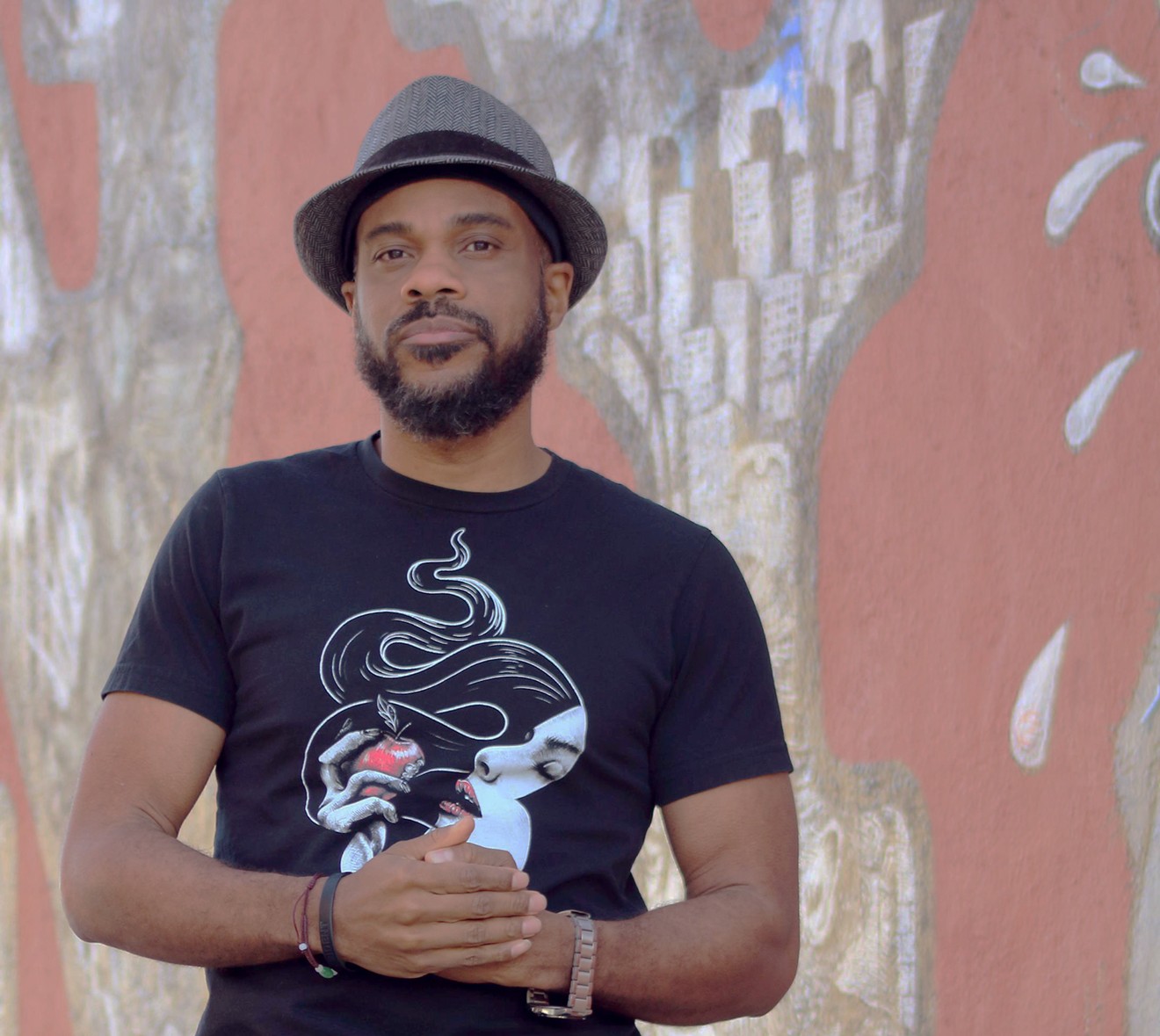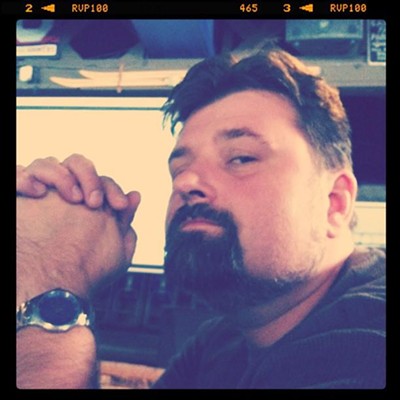Denver pop-culture writer, teacher and artist R. Alan Brooks is a busy guy, what with his podcast, his comic book, his work with Regis's Mile-High MFA, and his Colorado Sun comic What’d I Miss? — but he’s adding something to his already full plate. On August 15, he's hosting a seminar at Hope Tank called “Art in Evil Times: How to Stop Being Scared to Create It!” The program supports the idea that everyone’s voice is important —especially in our current social and political era — and asks the question, “What would you create if you weren’t afraid?”
We spoke with Brooks about how he plans to inspire local artists of all types to stand up and be heard — because now is the time.
Westword: So what brought you to offer this specific seminar? What do you want it to accomplish?
R. Alan Brooks: I've been an artist all my life. When I was in my twenties, I had these dreams of founding an artistic group, one that worked together, inspired and supported each other, and taught each other about their various disciplines. Time and time again, I'd spend days, months, years, talking with other artists about the things we dreamed of creating. But they almost never actually made anything.
This was true of rappers I knew, would-be authors, painters, photographers, and more. And it was so disappointing to me. It still is, when I consider all of the truly talented people that I know who the world will never hear about, because they are just too afraid to actually put any art out into the world.
And I have to say, about that fear — I didn't really know that it was the cause of so many friends never finishing their art. It took me some years to understand that. I'm wired a little differently. Ha, I don't usually feel fearful until after I've finished something. Then it's all panic attacks and insecurity for me.
But I feel like the world is being robbed of all of these beautiful contributions that these artists have to make. Fear is robbing us of beauty, and I hate that. So it became important to me to work on understanding fear, and identifying ways to help some of my creative friends overcome it.
The title of the seminar reminds me of the apocryphal Chinese curse: "May you live in interesting times." America is unarguably in an "interesting" period of its history — as is the world at large — but maybe there's undeserved safety in the metaphor. Calling something what it is carries power, value in defining what needs to be fought. Can you talk about the evil to which you're specifically referring? Is that (sadly) too large a question?
Ha, I guess hyperbolic language is part of promoting something. But in this case — children locked in cages, people jailed and separated from their children for legally requesting asylum, police brutality with little to no consequences for the officers involved, and a significant portion of devoutly religious people feverishly supporting these things — I'd be hard-pressed to find another word for it but "evil."
The seminar is all about "strategies for overcoming artistic fear." How do those strategies change when it's not just about the natural and ever-present effects of artistic self-doubt or the pressures of supporting oneself practically and financially while still being true to the artistic impulse?
That's a good question, but the focus of this particular seminar is about self-doubt. The mention of the present times is more directed towards why it's so vital for these artistic voices to be heard, now, more than ever.
Much of your past work has been oriented toward social justice — the term itself is part of the title of your podcast Mother F**cker in a Cape. What are those efforts in your professional past that you're most proud of, in those terms? How have you been fighting the good artistic fight? How do you want to do more?
Hm. I don't really dig folks who do the "false humility" thing. But it's also a little weird for me to try to identify what I'm proud of, when it relates to creating art that essentially says that human beings should be treated with compassion and dignity. I believe those things, and I communicate them through my art. And I love that people respond to my art in such powerful, positive and uplifting ways.
This has appeared in my writing, but I believe that all the "isms" — racism, sexism, ageism, etc. — come from either a refusal or a failure to recognize the humanity of others. If someone refuses, well, then they've made their choice, and I don't really need to bother trying to reach them. But for the people who simply fail at this, art is a powerful way to teach them to see from other perspectives, to embrace someone else's experience, and to help them along in recognizing the humanity of people who aren't like them. That's what I have in mind as I create.
Who are the creatives you've featured on Mother F**ker in a Cape that have inspired you most on a local level?
Wow. I've interviewed a lot of folks, both local and national. Jacenta Irlanda was a highlight. She's a Colorado therapist who uses comics in her work with her clients. Adrienne Norris' story is incredible: She's a black, gay, ex-military military martial artist who is most known for her series of paintings featuring women from history, called "Women Behaving Badly." One of my earliest interviews was with a local sex worker who creates comics. Her name is D. Sala, and she discussed how she got into comics and sex work, and both were fascinating.
Any creatives on the national stage that you would love to be able to feature on the podcast?
I have to say, I've been fortunate, in that I've been able to interview national figures, like Nichelle Nichols from Star Trek; Charisma Carpenter from Buffy the Vampire Slayer; James O'Barr, who created The Crow; and Lisa Berry from Supernatural.
That said, I'd love to talk to Markus and McFeely, the writers of Avengers: Endgame; Ta Nehisi Coates, who's known for his writing in a variety of genres, but also his run on the Black Panther comic book; and Ryan Coogler, writer/director of the Black Panther movie, would be great, too!
How do you see comics as a medium doing the work of social and political advocacy? The history is solid but spotty, isn't it? For every example of Stan Lee ignoring the comics code in order to do a Spider-Man drug-related storyline in which he believed, or the indictment of authoritarianism from Watchmen and Dark Knight Returns (what was it with 1986?), we have at the same time an endless string of racial, sexual, cultural and gender-based offenses from the same medium — not all of them from the less-woke early decades of its existence.
You definitely make fair points here. I've heard comics described as "one of the truly American art forms," along with jazz. I think that anything that is inherently American is going to inherit some of America's diverse and complicated history. That's not to absolve comics creators of their misdeeds.
But I think it's safer to think of comics as a tool, which the user can direct. When someone is well intentioned, and working to create more understanding, love and connection between humanity, then comics are a great tool for that. I think of books like Marjane Satrapi's Persepolis, Craig Thompson's Blankets, Congressman John Lewis' March or Jennifer Hayden's The Story of My Tits, and what I've learned from them all, and I truly see the power of this medium.
You recently went to the San Diego Comic Con, which you rightly defined as a "crazy clown show." What did you see there in terms of social and political restlessness emerging in our pop culture? There almost needs to be a "hundredth monkey" phenomenon in America, when the sleeping majority of citizens understand the plight of those who are paying attention, and suddenly understand that action has to be taken. Do you think that pop culture is the wrong place to look for that, or is that exactly one of the places where it has to happen, at this point in our civilization?
Man. I think it's tricky to get any sense of what the crowds are thinking at SDCC, primarily because there's so much zombie-like stumbling through the 100,000-plus crowd. That said, Denver cartoonist Ebony Flowers was there promoting her new graphic novel Hot Comb. It's a book about life as a black woman, in the setting of a black hair salon, and people seemed very engaged with the material.
As to your other question, I don't think people should depend on pop culture to inform them about the world, but I do think that pop culture is a good avenue to reach people.
So what's Denver's potential role in all this? How can we fight injustice locally, and what are those local injustices that deserve our attention? If we're going to truly "think globally, act locally," then where do we start in Colorado?
I think that's a big question, and there are a number of Denver activists who are better qualified to answer it than I am. People like Lonnie MF Allen, Thea Jovie Hunt, Dailen Ogden, Dion Harris (both he and Dailen are drawing my next edition of The Burning Metronome), Dylan Edwards, Cori Redford (who draws the weekly comic that I write for The Colorado Sun), Jake Fairly, Ted Intorcio and so many more. Our city is rich with comics creators who are saying meaningful things with their work.
R. Alan Brooks will host "Art in Evil Times" at 7 p.m. Thursday, August 15, at Hope Tank, 64 Broadway. Tickets are $10; find more information on the Facebook page.
[
{
"name": "Air - MediumRectangle - Inline Content - Mobile Display Size",
"component": "12017618",
"insertPoint": "2",
"requiredCountToDisplay": "2"
},{
"name": "Editor Picks",
"component": "17242653",
"insertPoint": "4",
"requiredCountToDisplay": "1"
},{
"name": "Inline Links",
"component": "18838239",
"insertPoint": "8th",
"startingPoint": 8,
"requiredCountToDisplay": "7",
"maxInsertions": 25
},{
"name": "Air - MediumRectangle - Combo - Inline Content",
"component": "17261320",
"insertPoint": "8th",
"startingPoint": 8,
"requiredCountToDisplay": "7",
"maxInsertions": 25
},{
"name": "Inline Links",
"component": "18838239",
"insertPoint": "8th",
"startingPoint": 12,
"requiredCountToDisplay": "11",
"maxInsertions": 25
},{
"name": "Air - Leaderboard Tower - Combo - Inline Content",
"component": "17261321",
"insertPoint": "8th",
"startingPoint": 12,
"requiredCountToDisplay": "11",
"maxInsertions": 25
}
]














